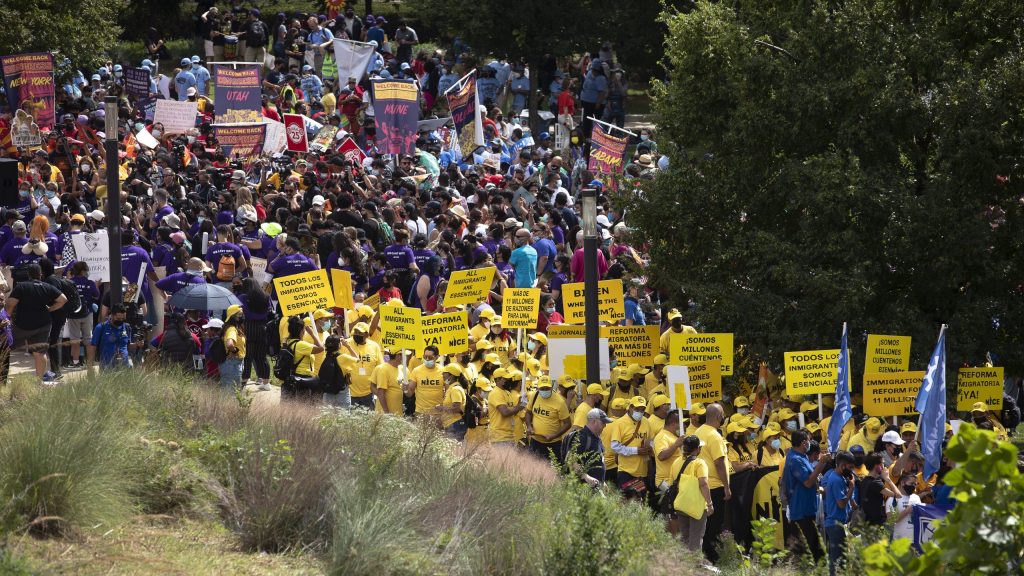Mario Ramirez of Milwaukee helped carry part of a homemade statue of Our Lady of Guadalupe that bobbed in the massive crowd headed toward the U.S. Immigration and Customs Enforcement building Sept. 21.
Though the Guatemalan immigrant is a permanent resident of the United States, he went out to march for immigration reform along with those who descended on Washington for a "Welcome Back Congress" rally seeking to bring issues of social justice, including climate change, to the attention of lawmakers.
But the issue that drew the largest crowd was immigration.
Thousands took to the streets of Washington, making a stop at an ICE facility before heading to the U.S. Capitol, urging that Congress and the president take action on immigration reform.
Rally participant Ramirez said he'd been able to adjust his immigration status after fleeing his native Guatemala because of war 34 years ago, "thanks to other groups that fought" for immigrants like him.
But the last large-scale change to the immigration system that helped him was in 1986 and he said he wanted to do something to help others, even if all he could was march on Washington with his group from Wisconsin, Voces de la Frontera (Border Voices), to get the attention of politicians.
"The march is a part of a nationwide effort to demand Congress ensure a pathway to citizenship stays in the budget reconciliation package, as well as investments in the care economy and green infrastructure that will help fight climate change," said a news release from CASA, a Latino and immigration advocacy organization based in Maryland.
"Immigrants, caregivers, and climate change have played and will continue to play a large role in the (U.S.) economic and social recovery," the release said. "Congress must deliver on their promises and address the issues that disproportionately affect communities of color."
The march took place just a day after the Senate parliamentarian nixed Democrats' plan to include immigration reform in the budget reconciliation bill process. But Democrats said they weren't giving up and would be presenting another plan.
Rallygoers, however, said that while they weren't losing hope, they were losing patience.
"We're tired of palliatives, of being treated like toys," said Ingrid Vaca, who described herself as a "Dreamer Mom," and said her children, now young adults, have some protections under the Deferred Action for Childhood Arrivals program. But they still have a lot of restrictions and remain uncertain about their future in the U.S. because Congress cannot come together to work on immigration reform that would once and for all help them.
"Basta," she said, using the Spanish word for "enough," as she described how she and her children have contributed to the country. Vaca has been in the country for 21 years after leaving her native Bolivia and has worked in Virginia cleaning houses and looking after the elderly as a caretaker, paying taxes and never receiving anything in return, she said.
She led a crowd of young adults in the chant "undocumented, unafraid."
Vaca said fighting for immigration reform was a matter of fighting against injustice. Immigrants took care of people who wouldn't leave their homes during the pandemic and have taken care of them before in a variety of ways but immigrants are still not allowed to be free in many ways, she said.
"When my mother died, I couldn't go home (to Bolivia)," she added. "My children couldn't go home to say a last goodbye. All we want is to live in freedom."
While most groups that attended included workers unions and students, several faith-based organizations also took part in the march.
German Fernandez helped carry a banner with the image of St. Oscar Romero, representing a solidarity committee bearing his name that supports "the dignity of the human being, including immigrants," he said.
St. Romero "always fought against injustice," he said, so it was important to have him present in some form in the crowd.
"And the fight continues," Fernandez said.

